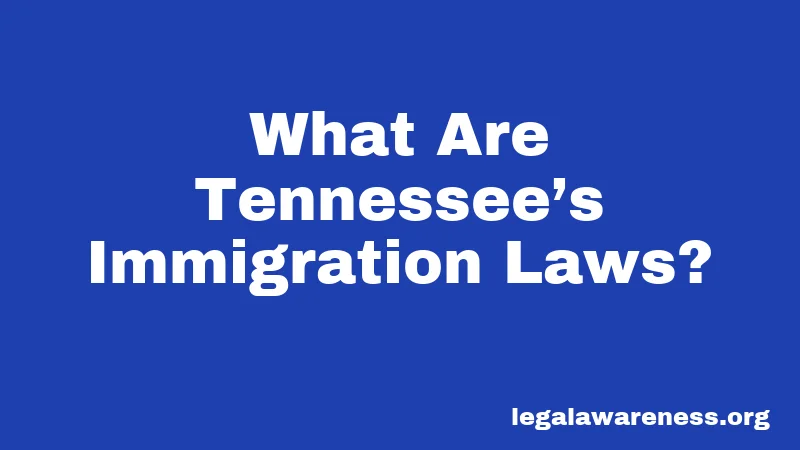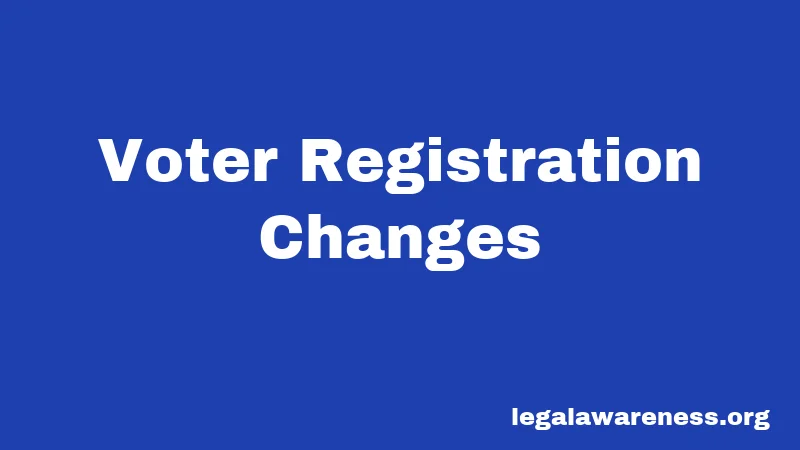Tennessee Immigration Laws in 2026: What’s Changed and What You Need to Know
Tennessee just made some serious changes to its immigration laws. Starting January 1, 2026, things are different for both employers and immigrants in the state. Most people don’t realize how strict these laws have become, honestly. But here’s the thing: whether you’re hiring employees, applying for a driver’s license, or voting, these new rules could affect you.
Let’s break down exactly what Tennessee now requires. We’ll cover employment rules, driver’s licenses, and what the penalties look like if you break the law.
What Are Tennessee’s Immigration Laws?

Tennessee’s immigration laws control how the state handles people who live and work there without legal status. These laws cover employment, identification, and enforcement.
Think of these laws like a comprehensive system. The state wants to make sure employers only hire people who can legally work. It also wants clear identification for voting and driving. Tennessee takes this pretty seriously, honestly.
Employment Verification: The Tennessee Lawful Employment Act
Who Has to Verify Workers?
Here’s where it gets important. If you run a business in Tennessee with 35 or more full-time employees (counting all employees under the same business ID), you must use E-Verify. E-Verify is a free federal program that checks if a worker can legally work in the U.S.
Employers with fewer than 35 employees don’t have to use E-Verify. But they still have choices. They can either use E-Verify anyway (honestly, it’s a good idea) or request documents from new hires that prove they’re allowed to work.
What Documents Work?
Employees can provide several documents to show they’re authorized to work. These include a valid driver’s license, passport, birth certificate, or immigration documents from the Department of Homeland Security.
The rule is simple. Employers need one document from the approved list. The document must show the person’s legal name and work authorization.
What Happens If Employers Don’t Comply?
Here’s where it gets serious. Employers who break these rules face real penalties. A first violation costs $500 plus another $500 for each employee not verified. If you get caught a second time, that’s $1,000 per violation plus $1,000 per employee.
Wait, there’s more. Three or more violations? That jumps to $2,500 per violation plus $2,500 for each employee. Plus, there’s an extra $500 per day if you don’t show proof of fixing the problem within 45 days.
Your business license gets suspended if you don’t comply. The state will also post your violation online. It’s pretty straightforward: check your workers or face the consequences.
New Rules Starting January 1, 2026

The Centralized Immigration Enforcement Division
Tennessee just created something new: a Centralized Immigration Enforcement Division under the Department of Safety. This division has a specific job. It coordinates with federal immigration authorities and hands out grants to local police departments that help with immigration enforcement.
This is a major shift. The state is now actively partnering with federal immigration authorities. Local law enforcement can get money to participate in immigration operations.
Different Driver’s Licenses for Non-Citizens
Starting January 1, 2026, Tennessee issues different driver’s licenses to non-citizens. These temporary photo IDs are easily identifiable at traffic stops and voting locations.
Here’s how it works. People on work visas (like F-1 student visas) and other legal immigrants can still get regular driver’s licenses. But if you’re not authorized to be in the U.S., your license looks different.
Not sure what this means for you? If you have legal status—whether you’re a student or authorized worker—you get a regular license. No problem, right?
Out-of-State Licenses Won’t Work
This one’s important. A license issued to an unauthorized immigrant by another state is not valid in Tennessee, making it a misdemeanor to drive in Tennessee with such a license.
Think of it like this: if you have an out-of-state license that was issued to someone without legal status, driving in Tennessee is now a crime. It’s a misdemeanor, which is less serious than a felony but still means fines and a criminal record.
Sanctuary Policy Penalties
What’s a Sanctuary Policy?
A sanctuary policy is basically a rule that stops local government from helping federal immigration authorities. Tennessee law defines these as policies that prohibit communication with federal officials to “verify or report immigration status of any alien” or grant undocumented immigrants the “right to lawful presence within the boundaries of this state.”
Tennessee had a rule against sanctuary cities since 2018. But honestly, it wasn’t strong enough. The state decided to add real teeth.
The New Felony
Here’s where it gets serious. Making it a Class E felony, punishable by up to 6 years in prison and a $3,000 fine, for any public official who votes in favor of sanctuary policies is now law.
Let’s be clear about this. If you’re a city council member, county official, or any public official and you vote to adopt a sanctuary policy, you could face a felony charge. This means potential jail time and a criminal record.
This is one of the strictest rules in the country, honestly. It puts significant pressure on local officials to cooperate with federal immigration enforcement.
Voter Registration Changes

Real-Time Citizenship Verification
Starting January 1, 2026, Tennessee requires real-time verification of U.S. citizenship and felony status before voter registration is completed.
What does this mean? When you register to vote, the state now checks immediately if you’re a citizen and don’t have certain felony convictions. The check happens right away instead of later.
Election Official Training
Election workers must now complete training on identifying the new temporary IDs issued to non-citizens. These officials need to recognize the different-looking licenses and prevent non-citizens from voting.
Special Circumstances and Exceptions
Legal Immigrants Can Still Get Regular Licenses
Stay with me here. If you’re legally in the United States, you can get a normal driver’s license. This includes people on F-1 student visas and those authorized to work.
You’re not alone if this confuses you. Many people think all non-citizens get different licenses. Not true. Only those without legal authorization get the temporary ID.
E-Verify Defense for Employers
If your business uses E-Verify and it shows an employee is authorized, you’re protected. Even if it turns out later that the employee wasn’t actually authorized, you’re not liable under Tennessee law. E-Verify is your legal shield.
Smaller employers (with fewer than 35 employees) don’t get this same protection. They need to follow E-Verify carefully or maintain documents on file.
Penalties and Consequences
Employment Violations
We covered employer penalties earlier. Let’s recap: violations range from $500 for the first problem to $2,500 for repeated violations. Plus additional penalties per employee.
Business license suspension is automatic if you don’t fix violations in 45 days. Your name gets posted publicly online. That’s serious stuff.
Misdemeanor Driving Violation
Driving with an out-of-state license issued to someone without legal status is a misdemeanor. This means criminal charges, fines, and possibly jail time up to 11 months and 29 days.
Felony Sanctuary Policy Violation
Public officials voting for sanctuary policies face up to 6 years in prison plus a $3,000 fine. This is the most serious penalty in Tennessee’s immigration law.
How to Comply and Stay Legal
For Employers: Use E-Verify or Maintain Documents
Here’s what you need to do. If your company has 35 or more employees, enroll in E-Verify immediately (it’s free). Verify all new employees and keep records.
If you have fewer than 35 employees, at minimum maintain approved identity documents. Request documents from every new hire before they start working. Keep copies in your records.
The Tennessee Department of Labor website has forms and guidance. Use them. It’s way easier to comply now than to deal with penalties later.
For Drivers and Identification Holders
Check your status. Do you have legal authorization to work and live in Tennessee? If yes, you can get a regular driver’s license starting January 1, 2026.
If you don’t have legal authorization, a temporary ID is available. Don’t try to use out-of-state licenses from other unauthorized immigrants. That’s now a crime.
For Voters
Register to verify your citizenship. The state will check immediately when you register. There’s no gray area anymore—you’re either a citizen or you’re not.
If you have questions about your citizenship status, contact your local election office. They can help clarify before you register.
For Local Officials
Understand what counts as a sanctuary policy under Tennessee law. Voting for policies that prevent communication with federal immigration authorities is now a felony.
If you’re confused about what’s allowed, consult a lawyer before voting on any immigration-related policies. It’s honestly the smart move.
Frequently Asked Questions
Do I need E-Verify if I have fewer than 35 employees?
No, it’s not required. But you must request and maintain approved identity documents from all new hires. E-Verify is recommended even for small employers because it provides legal protection.
Can I still get a regular driver’s license if I’m not a U.S. citizen?
Yes, if you have legal authorization to be in the U.S. This includes people on work visas and student visas. Only those without legal status get the temporary ID.
What happens if I drive in Tennessee with an out-of-state license issued to someone without legal status?
You can be charged with a misdemeanor. This means fines, criminal charges, and a criminal record. Don’t take this risk.
Can I vote if I’m a green card holder?
No. Voting requires U.S. citizenship. Green card holders cannot vote in Tennessee or anywhere in the U.S. The new real-time verification confirms this at registration.
What should I do if I’m worried about my employment verification status?
Talk to your HR department or employer. Ask them if your employment authorization was verified through E-Verify. Keep records of any documents you provided. If you’re concerned, consult an immigration attorney.
Final Thoughts
Tennessee’s immigration laws are now stricter and more complex. They changed significantly on January 1, 2026. Whether you’re an employer, employee, voter, or official, these rules likely affect you.
The best approach is to understand what applies to your situation. Employers should verify workers immediately. Immigrants should verify their legal status before getting ID or voting. Officials should consult lawyers before voting on immigration policies.
When in doubt, ask for help. The Tennessee Department of Labor can answer employment questions. Your local election office handles voting questions. An immigration lawyer can address legal status concerns.
Stay informed, follow the rules, and you’ll stay on the right side of Tennessee law.
